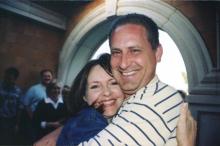Consistent Life Ethic

Pope Francis reiterated his strong opposition to abortion on Friday, saying it “compounds the grief of many women” already succumbing to what he called the “pressures of secular culture.”
Francis expressed concern about the challenges the African bishops faced in their communities, from abortion and divorce to violence against women and children.

Twelve years ago we took our beloved Maltese dog, Moose, to the vet and came home without him. Moose was in the late stages of congestive heart failure, and many times each day he was wheezing and crying out in pain. While my daughter held the little dog, the vet gave him a shot. It was over very quickly.
Why don't we treat death row prisoners at least as well as we treat dogs?
"Secret Drugs, Agonizing Deaths" is the headline on an article in yesterday's New York Times. Back when executioners wielded axes, they tended to wear hoods so people wouldn't recognize them. Nowadays states still conceal executioners' identities — and much more.

I WORK ON the frontlines of the movement to end the death penalty in the United States. I grew up in a conservative evangelical home and my faith has led me to this work. In 2008, I had the opportunity to hear stories from murder victims’ family members, death row exonorees, and corrections officials who participated in executions—all of whom believe the death penalty should be abolished. At that point I felt called to do this work and to begin engaging with other evangelicals.
I will confess, it was a lonely job when I started. I wondered who else would join me. So you can imagine my excitement at seeing what has today become a nationwide chorus of Christian voices questioning capital punishment.
A recent poll by the Barna Group showed a majority of Christians in the United States now oppose capital punishment and that young Christians oppose it by a large majority. More than two dozen evangelical leaders from around the country and across the political spectrum recently made their voices heard by publicly requesting a new sentencing hearing, free of racial bias, for a Texas death row inmate. Even conservative political leaders are speaking out against the death penalty.
As one who has been in the trenches on this issue for years, I can confirm that Christian engagement is helping to transform the death penalty debate, and I can tell you that it is being driven by the same forces that moved me—faith and cold, hard facts.

Nearly two years ago, Chick-fil-A CEO Dan T. Cathy caused a backlash when he said he supported marriage between a man and a woman. Gay groups announced boycotts, and Christian consumers rallied around the fast-food chain’s chicken sandwiches.
In a recent interview, however, Cathy said that while he still holds the same position, he regrets “making the company a symbol in the marriage debate.”
Similarly, when Phil Robertson was suspended from his popular reality TV show Duck Dynasty for making controversial comments about homosexuality to GQ magazine, gay groups cheered the decision as evangelical fans swamped the A&E network with complaints. Within a week, Robertson was reinstated.
So it was much the same this week when the evangelical relief group World Vision announced that it would allow employees who are in same-sex marriages. Within 48 hours, the $1 billion Christian organization reversed course, saying on Wednesday that it had made a mistake.

There is a moment in John Steinbeck’s classic, East of Eden, when readers witness the transformation of a stereotype into a human being.
Set in Salinas Valley, Calif., around the turn of the 20th century, Samuel Hamilton picks up Lee, his friend's Chinese servant. Lee wears a queue and speaks Pidgin English. Moments after meeting him, Hamilton learns that Lee was born in the U.S. and asks why he still can’t speak English.
Lee’s face and eyes soften and he speaks perfect English, explaining that he speaks Pidgin for the whites in town to understand him. Lee says, “You see what is, where most people see what they expect.”
Did you catch that? Lee plays the role of the foreigner in order to be seen and understood.

Once Steve Green sets his path, there’s no turning back.
Not when he saw no point in college, going directly into his family’s Hobby Lobby craft store business. Green, now 50, rose up from assembling picture frames for “bubble gum money” at age 7 through every job, including cleaning toilets, to president of the $3.3 billion national chain, one of the nation’s largest private companies.
And certainly not now when, he says, the U.S. government is challenging his unshakeable Christian faith and his religious liberty.

Prison guards meet in the desert to hand off chemicals for executions. A corrections boss loaded with cash travels to a pharmacy in another state to buy lethal sedatives. States across the country refuse to identify the drugs they use to put the condemned to death.
This is the curious state of capital punishment in America today.
At the same time, growing numbers of states are ending capital punishment altogether. Others are delaying executions until they have a better understanding of what chemicals work best. And the media report blow-by-blow details of prisoners gasping, snorting, or crying out during improvised lethal injection, taking seemingly forever to die.
Legal challenges across this new capital punishment landscape are flooding courts, further complicating efforts by states that want to keep putting people to death.


A Tennessee pharmacist and a Baptist church deacon who lost his job after an ongoing dispute over selling Plan B contraception has sued his former bosses, claiming he was fired because of his religious beliefs.
Lawyers for Philip M. Hall of Jamestown, Tenn., filed suit against the Walgreens drugstore chain in the U.S. District Court for the Middle District of Tennessee on Tuesday, claiming it discriminated against Hall’s religious beliefs.
Hall was fired in August after working six years for Walgreens. He believes Plan B contraceptives cause abortions and refused to dispense them. Plan B is a form of birth control that can prevent pregnancy if taken within 72 hours of unprotected sex. Many medical experts say it does not cause a miscarriage or abortion and won’t work if the fertilized egg is already implanted.

We may not all be rich. We don’t all have successful careers. We aren’t all healthy. But the one thing we all have are stories. From the beginning of time, we have thrived on connecting via stories. We consume stories for leisure, speak our stories for sanity, and create stories to capture our imagination.
We are swayed by stories. Stories can compel others in ways propositions and facts statements cannot. Our attention wanes at statistics and exegesis, but perks at vivid characters in an engaging plot. Stories have been proven to be an effective rhetorical device. They draw people’s attention in and leaves them satisfied upon conclusion.
You cannot debate a story. While it may be tempting to try and deconstruct the reasoning behind stories when it goes against your agenda, the genius of stories is that it can’t be used as an argument. The story of a chain smoker’s longevity sits uncomfortably in the presence of someone advocating the ills of nicotine. The story just is. We cannot alter it, the only thing we can control is how we choose to respond to it. Any attempts to dishonor or discredit someone’s story is an assault to their humanity.


The abortion rate in the U.S. has dropped to its lowest level since the procedure became legal in 1973, according to a new data analysis that reflects a 13 percent decline in both the abortion rate and the number of abortions from 2008 to 2011.
The report being issued Monday by the Guttmacher Institute in New York finds the 2011 rate declined to 16.9 abortions per 1,000 women ages 15-44, second only to 1973, when the rate was 16.3 per 1,000.
Declines were seen in all but six states — Alaska, Maryland, Montana, New Hampshire, West Virginia, and Wyoming — which saw either no change or an increase in abortion rates.

Conception. Pregnancy. Abortion. Abortifacient.
Those words today are in a rhetorical swamp where contesting religious, medical, and political views muddy understanding. And soon the U.S. Supreme Court will wade in.
On March 25, it will hear challenges to the Affordable Care Act’s provision that employers must provide insurance coverage with no co-pays for contraception.

Call me old fashioned, but our culture hit a new low at the Grammys when 33 couples were married. Some of them were gay and lesbian couples.
Indeed, it was a bad day for marriage.
First, Macklemore sang "Same Love," then Queen Latifah officiated a wedding for 33 couples, and then Madonna sang her 1986 single "Open Your Heart."
Now, don’t get me wrong. I love Macklemore’s Same Love. I love its pro-same-sex marriage message because of my Christian faith, not in spite of it. I’ve written about why Christians should embrace same-sex marriage here, here, and here, but Macklemore’s theological argument in the song is as good as any.

The son of a Florida fertility doctor was sentenced Monday to nearly 14 years in federal prison for duping his pregnant girlfriend into taking medication that caused her to abort her 6-week-old fetus.
John Andrew Welden, 29, had pleaded guilty in September to forging a prescription for Cytotec, the brand name for misoprostol, in March 2013, which he relabeled as the common antibiotic amoxicillin. He convinced his former lover, Remee Jo Lee, that she had an infection and needed to take the antibiotic he claimed his father had prescribed. She miscarried within hours.
Welden, of Lutz, near Tampa, was sentenced to 13 years, eight months in a minimum-security facility, four months less than what prosecutors had sought in exchange for dropping a murder charge.

Every time he goes to the doctor’s office, Daniel Eddinger takes a leap of faith.
Eddinger, a 28-year-old father of two from Lexington, N.C., doesn’t have health insurance.
But he’s not worried about the cost of getting sick.
Instead of insurance, he says, he relies on God — and the help of other believers — to pay his medical bills.

The Rev. Frank Pavone, head of Priests for Life and a leading anti-abortion crusader, was braving freezing temperatures with thousands of others at the annual March for Life on Wednesday, but at least he can look forward to a warm embrace from the Catholic Church.
After years of tensions with various bishops, Pavone has complied with demands to straighten out the group’s finances and to become accountable to his home diocese in New York.
The news came in a December letter sent to the nation’s Catholic bishops by Bishop Patrick J. Zurek of Amarillo, Texas, where Priests for Life has been based for several years.

Conservative Protestants in red states aren’t the only ones seeing high divorce rates — so are their neighbors, according to a new study.
Researchers found that simply living in an area with a large concentration of conservative Protestants increases the chances of divorce, even for those who are not themselves conservative Protestants.
According to researchers who took into account race, income, and other factors, marriage and fertility trends that are common among conservative Protestants — younger marriage, more kids, less higher education — affect all people in areas most populated by conservative Protestants, no matter their personal religious affiliation.

Folks who have just knocked back two drinks say they’re really aware of God at that moment.
And good sleep enhances a sense of God, joy, peace, and love.
Who knew?
Actually, about 160 people, so far, know such details about their spiritual lives. They were the first participants in SoulPulse, a newly launched, ongoing study of spirituality in daily life.
It’s an “experiential” research survey inspired by pastor/author John Ortberg and conducted by a team led by Bradley Wright, an associate professor of sociology at the University of Connecticut and author of Christians Are Hate-Filled Hypocrites … and Other Lies You’ve Been Told.
Twice a day for two weeks, participants receive questions asking about their experiences of spirituality, their emotions, activities, and more at the moment the text messages arrive.

My mom died in a nursing home five years ago this week. She spent the last 10 months of her life there following a severe stroke. Mary was buried next to her mom, Ann, at the top of a gently rising hill in a cemetery during a 13-inch snowfall in Cleveland.
There was a lot of talk about hot chocolate that day.
My mom always found ways to give something to others. Multiple sclerosis forced her to use a wheelchair, but she still figured out ways to give gifts. She took a ceramics class in her apartment building and made Christmas ornaments for family and friends. Some of them hang on our tree even now. A red-nosed reindeer that she made stands in our living room each December.
After her stroke, she was very limited. One side of her body didn’t work at all. She was bedridden those last 10 months. Still, she found a way to give. When the attendants at her nursing home came around and asked what she wanted for each meal, she ordered a packet of hot chocolate with it.
She didn’t like hot chocolate. Never drank it. But she saw an opportunity to come up with a gift. She saved the packets of hot chocolate and gave them to my sister Joanne, who has two boys. They would get the gift of hot chocolate from her.
What a remarkable gesture, eh? Even confined to a bed, she found a way to give.